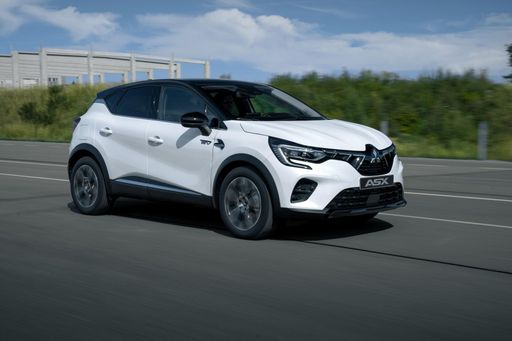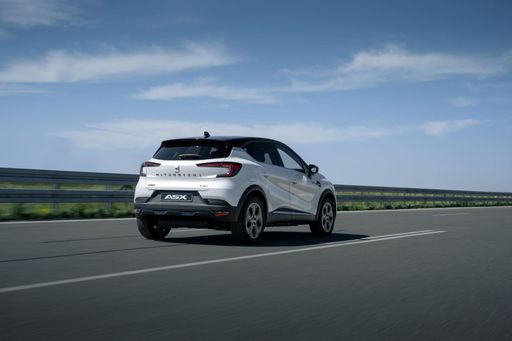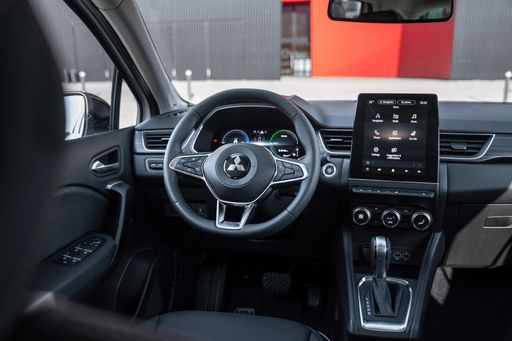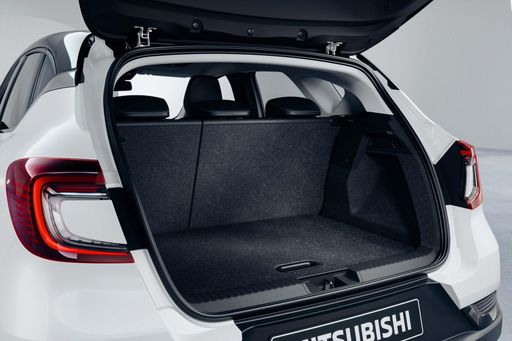Toyota Yaris Cross VS Mitsubishi ASX
In the competitive segment of compact SUVs, the Mitsubishi ASX stands out with its robust design and practicality, making it an ideal choice for urban adventurers. In contrast, the Toyota Yaris Cross combines sporty aesthetics with impressive fuel efficiency, appealing to eco-conscious drivers without compromising on style. Ultimately, both models cater to different preferences, offering unique strengths that cater to diverse customer needs.
Toyota Yaris Cross
The Toyota Yaris Cross combines the practicality of a compact SUV with the agility of a smaller car, making it ideal for urban adventures. Its elevated seating position offers excellent visibility, while the stylish design ensures it stands out on the city streets. Inside, the Yaris Cross boasts a modern interior with advanced technology features designed to enhance the driving experience.
detailsMitsubishi ASX
The Mitsubishi ASX presents itself as a compact crossover that combines practicality with style. Its sleek design and versatile interior make it an appealing choice for both urban and rural settings. With a focus on providing a comfortable driving experience, the ASX also offers a range of modern features that enhance connectivity and safety.
detailsIntroducing the Contenders: Mitsubishi ASX vs. Toyota Yaris Cross
The automotive market is bustling with new entrants and captivating models, but the competition between the Mitsubishi ASX and the Toyota Yaris Cross stands out. Both SUVs provide a blend of style, efficiency, and modern technology, appealing to the adventurous and eco-conscious driver alike. In this comparison, we will delve into their technical specifications and innovations that set these two models apart.
Engine and Performance Overview
The Mitsubishi ASX offers a range of engines including petrol, hybrid, and mild hybrid options. The available power outputs range from 91 HP in entry-level variants to as much as 158 HP for the more powerful variants, paired with either a manual gearbox or an automatic transmission. With 0-100 km/h acceleration times ranging from 8.5 seconds to over 14 seconds, performance varies significantly based on the chosen engine. The ASX boasts a top speed of up to 180 km/h and offers a maximum torque of 270 Nm with a curb weight between 1296 kg and 1501 kg depending on the variant.
On the other hand, the Toyota Yaris Cross is exclusively equipped with a full hybrid system generating up to 130 HP. This SUV reaches 0-100 km/h in a respectable 10.7 seconds, equipped with a CVT automatic transmission. It is lighter than its rival, with curb weights ranging from 1180 kg to 1290 kg, contributing to its nimbleness on the road. With a maximum speed of 170 km/h, the Yaris Cross may not be the fastest contender, but its efficiency and innovation make it an impressive option.
Fuel Efficiency and Emissions
When it comes to fuel efficiency, the Mitsubishi ASX demonstrates commendable figures, achieving consumption rates between 4.7 to 6 L/100km. Its CO2 emission rates range from 107 to 135 g/km, depending on engine choice, placing it in a competitive position in terms of environmental friendliness.
In contrast, the Toyota Yaris Cross shines in this category, emphasizing its hybrid technology. It boasts impressive fuel consumption figures ranging from 4.5 to 4.8 L/100km and even lower CO2 emissions of 101 to 108 g/km. For environmentally conscious consumers, the Yaris Cross presents a clear advantage, promising reduced fuel costs and a smaller carbon footprint.
Interior Space and Comfort
Both SUVs offer comfortable interiors with seating for five, but they differ significantly in trunk capacity. The Mitsubishi ASX provides a generous trunk space of 484 liters, making it suitable for family outings or road trips. Conversely, the Yaris Cross, while slightly less spacious, still offers respectable trunk volumes of 320 to 397 liters depending on the variant.
Interior material quality and technology features also play crucial roles in the driving experience. The ASX, being a more traditional SUV, provides a well-rounded cabin experience; however, its technology might feel slightly less advanced when compared to the Yaris Cross’s modern infotainment system and hybrid-specific features.
Safety and Innovations
Both models come equipped with a range of safety features, including advanced driver-assistance systems (ADAS). Mitsubishi incorporates its own safety technology, emphasizing a blend of pre-collision systems and lane-keeping assist. The Yaris Cross, however, excels with Toyota's Safety Sense technology, offering features such as adaptive cruise control, lane departure alert, and automatic high beams, setting a high benchmark in vehicle safety.
Final Thoughts: Which One to Choose?
Choosing between the Mitsubishi ASX and Toyota Yaris Cross ultimately depends on the buyer's priorities. For those seeking versatility, ample cargo space, and multiple engine options, the ASX holds appeal. Conversely, the Yaris Cross's hybrid efficiency, lower emissions, and innovative safety technologies make it the ideal choice for environmentally conscious drivers.
In this face-off between two exceptional SUVs, both models hold their unique strengths. As both brands continue to innovate, the competition is only expected to heat up, promising exciting options for consumers in the future.
 @ Toyota
@ Toyota
 @ Toyota
@ Toyota
 @ Toyota
@ Toyota
 @ Toyota
@ Toyota
 @ Toyota
@ Toyota
 @ Toyota
@ Toyota
 @ Toyota
@ Toyota
 @ Mitsubishi
@ Mitsubishi
 @ Mitsubishi
@ Mitsubishi
 @ Mitsubishi
@ Mitsubishi
 @ Mitsubishi
@ Mitsubishi

|

|
|
|
|
Costs and Consumption |
|
|---|---|
|
Price
about 24200 - 33900
£
|
Price
about 20600 - 32000
£
|
|
Consumption L/100km
4.5 - 4.8
L
|
Consumption L/100km
4.7 - 6
L
|
|
Consumption kWh/100km
-
|
Consumption kWh/100km
-
|
|
Electric Range
-
|
Electric Range
-
|
|
Battery Capacity
-
|
Battery Capacity
0.6
kWh
|
|
co2
101 - 108
g/km
|
co2
107 - 135
g/km
|
|
Fuel tank capacity
36
L
|
Fuel tank capacity
48
L
|
Dimensions and Body |
|
|
Body Type
SUV
|
Body Type
SUV
|
|
Seats
5
|
Seats
5
|
|
Doors
5
|
Doors
5
|
|
Curb weight
1180 - 1290
kg
|
Curb weight
1296 - 1501
kg
|
|
Trunk capacity
320 - 397
L
|
Trunk capacity
348 - 484
L
|
|
Length
4180
mm
|
Length
4239
mm
|
|
Width
1765
mm
|
Width
1797
mm
|
|
Height
1595
mm
|
Height
1575
mm
|
|
Payload
485 - 510
kg
|
Payload
399 - 449
kg
|
Engine and Performance |
|
|
Engine Type
Full Hybrid
|
Engine Type
Petrol, Petrol MHEV, Full Hybrid
|
|
Transmission
Automatic
|
Transmission
Manuel, Automatic
|
|
Transmission Detail
CVT
|
Transmission Detail
Manual Gearbox, Automat. Schaltgetriebe (Doppelkupplung), Automatic Gearbox
|
|
Drive Type
Front-Wheel Drive
|
Drive Type
Front-Wheel Drive
|
|
Power HP
116 - 130
HP
|
Power HP
91 - 158
HP
|
|
Acceleration 0-100km/h
10.7 - 11.3
s
|
Acceleration 0-100km/h
8.5 - 14
s
|
|
Max Speed
170
km/h
|
Max Speed
168 - 180
km/h
|
|
Torque
-
|
Torque
160 - 270
Nm
|
|
Number of Cylinders
3
|
Number of Cylinders
3 - 4
|
|
Power kW
85 - 96
kW
|
Power kW
67 - 116
kW
|
|
Engine capacity
1490
cm3
|
Engine capacity
999 - 1598
cm3
|
|
Top speed
170
km/h
|
Top speed
168 - 180
km/h
|
General |
|
|
Model Year
2024
|
Model Year
2024
|
|
CO2 Efficiency Class
C
|
CO2 Efficiency Class
D, C
|
|
Brand
Toyota
|
Brand
Mitsubishi
|
Toyota Yaris Cross
Discovering the Toyota Yaris Cross: The Compact SUV Redefined
The Toyota Yaris Cross has boldly entered the compact SUV market, sporting a blend of sleek aesthetics, advanced hybrid technology, and practical functionality. As urban driving dynamics evolve, this vehicle meets the demands of modern motorists with an impressive performance and eco-friendly technology, setting itself apart in a bustling segment.
Performance and Efficiency: Hybrid Innovation at Its Best
The Yaris Cross is designed to provide an engaging driving experience combined with remarkable efficiency. At its heart lies a full hybrid powertrain, offering options between 116 PS and 130 PS, efficiently paired with Toyota's CVT automatic transmission. The hybrid system seamlessly integrates a petrol engine with an electric motor, optimising power delivery and responsiveness.
Drivers will appreciate the low fuel consumption, which ranges from 4.5 to 4.8 litres per 100 km, and equally impressive CO2 emissions of 101 to 108 g/km, aligning with the industry's ongoing commitment to sustainability.
Design and Dimensions: Compact Yet Spacious
The Yaris Cross offers a perfect blend of compact design and interior spaciousness, making it an ideal choice for urban environments. Measuring 4,180 mm in length, 1,765 mm in width, and 1,595 mm in height, the vehicle manages to provide a refined SUV stature without sacrificing manoeuvrability.
Its five-door layout and flexible boot space, ranging from 320 to 397 litres, make it practical for everything from city commutes to weekend getaways. The increased ride height adds to the SUV appeal, providing drivers with that coveted higher driving position and improved visibility.
Advanced Technology and Features
The Toyota Yaris Cross is well-equipped with an array of technological features, defined by its various trim levels including the Business Edition CVT, Comfort CVT, and the sporty GR Sport CVT. Each model is crafted to cater to diverse consumer needs, whether one prioritises enhanced comfort, sporty aesthetics, or comprehensive safety features.
Key innovations include a state-of-the-art infotainment system, advanced driver assistance features, and the Toyota Safety Sense package that enhances driver confidence through adaptive cruise control, lane keep assist, and more.
Driving Experience: Safety and Comfort in Focus
The Yaris Cross is not just about performance but also ensures safety and comfort for all occupants. The vehicle offers a smooth and quiet ride thanks to its refined suspension system and cleverly designed cabin, reducing noise and vibration levels.
The advanced safety suite within the Yaris Cross, encompassing multiple airbags, stability control, and a host of driver assistance systems, is designed to provide protection and peace of mind, every time you step into the driver's seat.
Conclusion: A New Benchmark in the Compact SUV Segment
The Toyota Yaris Cross stands as a testament to Toyota's commitment to producing environmentally friendly vehicles without compromising on performance or style. It strikes a harmonious balance between innovation, efficiency, and practicality, offering consumers a compact SUV that is both exciting to drive and easy to live with.
As we move further into an era of hybrid advancements and smarter automotive solutions, the Yaris Cross embodies these principles exceptionally, proving to be a robust and reliable partner for the modern driver.
Mitsubishi ASX
The Mitsubishi ASX: A Modern SUV with Advanced Features
The Mitsubishi ASX continues to be a popular choice for SUV enthusiasts, combining sleek design, impressive efficiency, and innovative technology. The 2024 model year introduces an array of improvements, making it a worthy contender in its category. In this article, we will delve into the technical details and innovative aspects of the Mitsubishi ASX, presenting why it stands out in the SUV segment.
Sophisticated Powertrains and Efficiency
Under the bonnet, the Mitsubishi ASX offers a variety of powertrain options, catering to different driving preferences. Customers can choose from petrol engines, mild-hybrid systems, and full-hybrid configurations, balancing power and efficiency effectively.
The performance spectrum ranges from 91 PS to 158 PS, demonstrating the vehicle's versatility. With a fuel consumption of between 4.7 and 6 L/100km, the ASX effectively manages fuel efficiency without compromising on performance. The car's CO2 emissions range from 107 to 135 g/km, placing it within CO2 efficiency classes C and D.
Advanced Transmission Options
The ASX offers a mixture of manual and automatic transmissions to meet diverse driving needs. Its gearbox specifications include a standard manual option and automatic options such as dual-clutch transmissions, providing a seamless driving experience. Depending on the variant, the vehicle can accelerate from 0 to 100 km/h in as little as 8.5 seconds, reaching maximum speeds between 168 and 180 km/h.
Modern Design and Spacious Interior
Externally, the ASX reflects contemporary design aesthetics, with dimensions of 4239 mm in length, 1797 mm in width, and 1575 mm in height. Internally, it accommodates up to five passengers comfortably and offers a respectable boot capacity ranging from 348 to 484 litres. Despite its spaciousness, the SUV maintains an optimal weight between 1296 and 1501 kg, which aids in delivering its intended driving dynamics.
Safety and Technology Innovations
Mitsubishi prioritises safety and technology in the ASX. It is equipped with the latest driver-assistance systems, enhancing safety and convenience. The modern infotainment system integrates smoothly with smartphones, ensuring that connectivity is at the driver's fingertips. Moreover, various trimming levels such as "Intro Edition DCT" and "Top Automatik" allow customers to select features best suited to their lifestyle, from basic utilities to luxury enhancements.
Conclusion: A Balanced SUV Choice
The Mitsubishi ASX stands out as a well-rounded SUV choice for those who prioritise efficiency, reliability, and modern technology. Its array of powertrains, stylish design, and advanced safety features make it an attractive option within its price range of €23,990 to €37,390. The ASX's 2024 model reaffirms Mitsubishi’s commitment to offering innovative yet practical vehicles to the global market.
